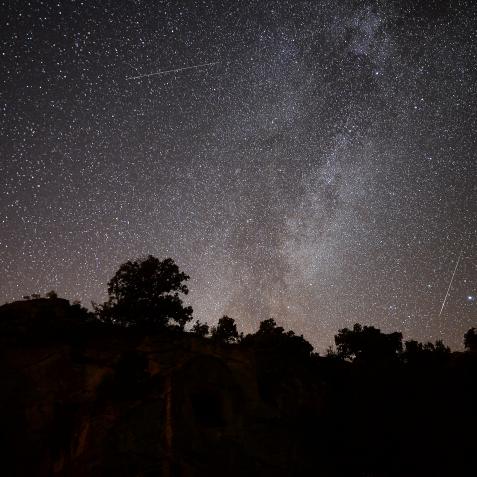
Adastra
What are the Chances of Life Appearing On…Earth?

Just how lucky are we on Earth? What were the chances that life would arise, let alone lead to intelligence?
These are vexing scientific questions, and using a new statistical approach, researchers have found a potential answer: we might be kind of, sort of, maybe a little bit luckier than average.

Our Answers are Guesses
It's hard to estimate the chances of life and intelligence arising on any given planet because we only have one and only one example of life and intelligence arising on a planet. But while this single data point isn’t as useful as multiple data points, it can still come in handy. Whatever your estimate of life appearing and evolving to intelligence includes, it must confront the bare-naked fact that it happened here, once.
And there's even more nuance to our little petri dish called planet Earth. As far as our best fossil evidence can tell, life arose very early on in the Earth's history, less than 500 million years after the formation of the planet itself. For all intents and purposes life appeared as soon as conditions were favorable enough for life to appear (geologically speaking).

CHRISTOPH BURGSTEDT/SCIENCE PHOTO LIBRARY
3d illustration of cell division, cell membrane and a splitting red nucleus.
Intelligence is Hard
On the other hand, intelligence took an extremely long time to appear: four and a half billion years until humans arose and started asking about their origins. This is so late in the history of the Earth that it's basically the last chance for intelligence. In just a few hundred million years, our sun will grow too hot to support liquid water on our planet, erasing all potential for a new intelligence to arise.
In other words, life appear quickly, but intelligence didn’t come around until the very last chance.
So, is life in general very common and easy to form, and life appeared early in the Earth's history because that's exactly what life does? Or is life incredibly rare, and the Earth got exceptionally lucky? And on the other end, is intelligence a precious thing in the cosmos, explaining why it took so long for it to show up? Or is intelligence relatively common too, and Earth just experienced a case of very bad luck over the past four billion years?

peterspiro
Research is Hard, Too
To you answer these questions, researchers at Columbia University turned to a statistical modeling with a technique called Bayesian inference. This technique doesn't just take a model at face value, it folds in the facts that we know - the fact that life appeared early and intelligence appeared late.
The researchers had to pick a particular model to describe the chances of life and intelligence appearing on the planet. And the particular model that they picked assumes that there is a constant chance in any given chunk of time for life and intelligence to appear. What we don't know is that constant chance. It could be that once conditions are favorable, life has a 10% chance of appearing in any given hundred million years. Or 90%. Or 1%. And likewise, for intelligence.
Yes, it is a model and no, it's not perfect. But it's a start, and it helps us answer some very basic questions.
To simplify the calculations and eliminate as much ignorance as possible, the researchers compared a few distinct scenarios: life is common and so is intelligence; life is common, but intelligence is not; life is rare and so is intelligence; and life is rare but intelligence easily follows from it.
Given the fact that life appeared early, but intelligence appeared late, this model tells us some useful things. For example, the hypothesis that life is rare doesn’t jibe with the fact that life showed up basically as soon as possible on Earth. And conversely, if intelligence were easy, what took us so long to get here?
Putting it all together, combining the model with our admittedly limited data, the researchers found that if we were to rerun the clock and start the Earth back again the same way it was billions of years ago, there's a three to one chance that life would appear again.
And as for intelligence? That's slightly less favorable, with a 3-2 to chance that intelligence never arises even with life flourishing for billions of years.
So far this model can’t be applied to estimating the chances of finding extraterrestrial creatures, since it's targeted to our history here on Earth… but it's a start.



















